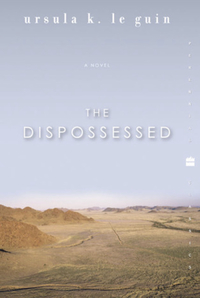Take a photo of a barcode or cover
Finally.
It has taken me five long months to finish this book. I would pick it up time and time again and most times only manage small stretches as I struggled to get through it.
I have endured this novel, stubborn to the last, and I can finally say it is done.
I have read a few Ursula K. Le Guin books before and adored them. So much so, I would happily declare her a favoured author when it came to sci-fi works. But this book? Shevek was not a character I enjoyed reading about -- a shame as the whole book was about him.
It was heavy with scientific terminology and notions which bogged down the text for me and drew me out of the fascinating worlds and characters presented to me. Too much Psychics for me to truly enjoy it... Disappointing to say the least. It was intriguing to see how society on Urras had developed and I found the characters introduced there the most fascinating. Anarres on the other hand, while okay to read about, was much more like our society so I was less interested to read about it or the characters introduced there.
Admittedly, there were a few times I got lost in the muddle of words and it would take me a few pages to catch up again and work everything out, which wasn't a fun experience at all...
There are moments of Le Guin's brilliant writing that shine through but if this book doesn't immediately capture you the way her other works can, then don't be foolish like me. It's okay to give up.
It has taken me five long months to finish this book. I would pick it up time and time again and most times only manage small stretches as I struggled to get through it.
I have endured this novel, stubborn to the last, and I can finally say it is done.
I have read a few Ursula K. Le Guin books before and adored them. So much so, I would happily declare her a favoured author when it came to sci-fi works. But this book? Shevek was not a character I enjoyed reading about -- a shame as the whole book was about him.
It was heavy with scientific terminology and notions which bogged down the text for me and drew me out of the fascinating worlds and characters presented to me. Too much Psychics for me to truly enjoy it... Disappointing to say the least. It was intriguing to see how society on Urras had developed and I found the characters introduced there the most fascinating. Anarres on the other hand, while okay to read about, was much more like our society so I was less interested to read about it or the characters introduced there.
Admittedly, there were a few times I got lost in the muddle of words and it would take me a few pages to catch up again and work everything out, which wasn't a fun experience at all...
There are moments of Le Guin's brilliant writing that shine through but if this book doesn't immediately capture you the way her other works can, then don't be foolish like me. It's okay to give up.
still processing. will report back later. truly fantastic and nuanced and complicated in all the right ways. ursula has never missed.
adventurous
reflective
slow-paced
Plot or Character Driven:
A mix
Strong character development:
No
Loveable characters:
No
Diverse cast of characters:
Yes
Flaws of characters a main focus:
No
adventurous
emotional
hopeful
informative
inspiring
reflective
medium-paced
Plot or Character Driven:
A mix
Strong character development:
Yes
Loveable characters:
Complicated
Diverse cast of characters:
Yes
Flaws of characters a main focus:
Complicated
Overall, I really liked this book. Its ideas are powerful: freedom, community, what we give up for progress, and how societies shape people. It gave me a lot to think about, and I’m glad I read it.
That said, I found her writing style tough at times. Not bad, just heavy. I don’t know if it’s the age of the book or if I’ve just gotten used to more modern sci-fi, but she seems to use big words when small ones would do. I had to slow down and really focus in some spots, which took me out of the story now and then.
But even when it’s a challenge, I always finish her books feeling like I gained something. This one made me reflect on how we live, what we expect from others, and what a truly “free” society might look like. It’s not an easy read, but it’s definitely a meaningful one.
That said, I found her writing style tough at times. Not bad, just heavy. I don’t know if it’s the age of the book or if I’ve just gotten used to more modern sci-fi, but she seems to use big words when small ones would do. I had to slow down and really focus in some spots, which took me out of the story now and then.
But even when it’s a challenge, I always finish her books feeling like I gained something. This one made me reflect on how we live, what we expect from others, and what a truly “free” society might look like. It’s not an easy read, but it’s definitely a meaningful one.
adventurous
inspiring
reflective
medium-paced
Plot or Character Driven:
Character
Strong character development:
Yes
Loveable characters:
Yes
Diverse cast of characters:
Complicated
Flaws of characters a main focus:
No
adventurous
dark
mysterious
tense
medium-paced
Plot or Character Driven:
A mix
Strong character development:
No
Loveable characters:
No
Diverse cast of characters:
No
Flaws of characters a main focus:
Complicated
Maybe I should just come to terms that sci-fi/fantasy is not my genre
adventurous
inspiring
reflective
medium-paced
Plot or Character Driven:
A mix
Strong character development:
Yes
Loveable characters:
Yes
Diverse cast of characters:
Yes
Flaws of characters a main focus:
Complicated
I think one of my favorite books this year, I think it'll take some time to further process but I think the prose and world building is very approachable! I was worried upon the first few chapters that it would be hard to parse but it makes sense with the context of the world and isn't overwhelming. Really loved the reflection from the characters and the growth. Initially I thought the two mismatched storytelling would be annoying but I like how the circle completed at the end so you saw how it all ended up converging, very beautiful given the text.
Waaay too many bookmarks and I think it's just bookmarked an entire page too but yeah this book is wonderfully compassionate in the way it can really make you see how norms we might be well adjusted to (how Urras is) and how an outside perspective could see it. But also, the outside perspective has its own problems, definitely will re-read in the future! <3
Waaay too many bookmarks and I think it's just bookmarked an entire page too but yeah this book is wonderfully compassionate in the way it can really make you see how norms we might be well adjusted to (how Urras is) and how an outside perspective could see it. But also, the outside perspective has its own problems, definitely will re-read in the future! <3
challenging
reflective
slow-paced
Plot or Character Driven:
Character
Strong character development:
Yes
Loveable characters:
No
Diverse cast of characters:
Complicated
Flaws of characters a main focus:
Yes
adventurous
inspiring
reflective
medium-paced
Plot or Character Driven:
Character
Strong character development:
Yes
Loveable characters:
Yes
Diverse cast of characters:
Complicated
Flaws of characters a main focus:
Complicated



